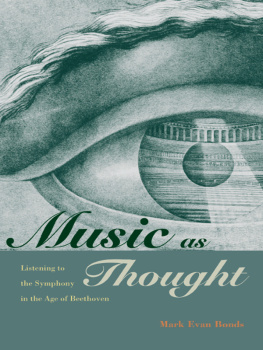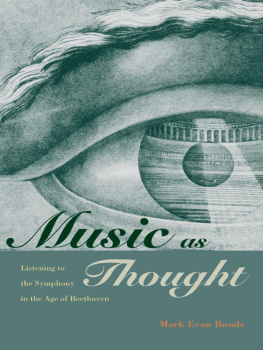Mark Evan Bonds - Beethoven
Here you can read online Mark Evan Bonds - Beethoven full text of the book (entire story) in english for free. Download pdf and epub, get meaning, cover and reviews about this ebook. year: 2020, publisher: Oxford University Press, genre: Detective and thriller. Description of the work, (preface) as well as reviews are available. Best literature library LitArk.com created for fans of good reading and offers a wide selection of genres:
Romance novel
Science fiction
Adventure
Detective
Science
History
Home and family
Prose
Art
Politics
Computer
Non-fiction
Religion
Business
Children
Humor
Choose a favorite category and find really read worthwhile books. Enjoy immersion in the world of imagination, feel the emotions of the characters or learn something new for yourself, make an fascinating discovery.
- Book:Beethoven
- Author:
- Publisher:Oxford University Press
- Genre:
- Year:2020
- Rating:4 / 5
- Favourites:Add to favourites
- Your mark:
- 80
- 1
- 2
- 3
- 4
- 5
Beethoven: summary, description and annotation
We offer to read an annotation, description, summary or preface (depends on what the author of the book "Beethoven" wrote himself). If you haven't found the necessary information about the book — write in the comments, we will try to find it.
Beethoven — read online for free the complete book (whole text) full work
Below is the text of the book, divided by pages. System saving the place of the last page read, allows you to conveniently read the book "Beethoven" online for free, without having to search again every time where you left off. Put a bookmark, and you can go to the page where you finished reading at any time.
Font size:
Interval:
Bookmark:


Oxford University Press is a department of the University of Oxford. It furthers the Universitys objective of excellence in research, scholarship, and education by publishing worldwide. Oxford is a registered trade mark of Oxford University Press in the UK and certain other countries.
Published in the United States of America by Oxford University Press
198 Madison Avenue, New York, NY 10016, United States of America.
Oxford University Press 2020
All rights reserved. No part of this publication may be reproduced, stored in a retrieval system, or transmitted, in any form or by any means, without the prior permission in writing of Oxford University Press, or as expressly permitted by law, by license, or under terms agreed with the appropriate reproduction rights organization. Inquiries concerning reproduction outside the scope of the above should be sent to the Rights Department, Oxford University Press, at the address above.
You must not circulate this work in any other form and you must impose this same condition on any acquirer.
Library of Congress Cataloging-in-Publication Data
Names: Bonds, Mark Evan, author.
Title: Beethoven : variations on a life / Mark Evan Bonds.
Description: New York : Oxford University Press, 2020. |
Includes bibliographical references and index.
Identifiers: LCCN 2019053066 (print) | LCCN 2019053067 (ebook) |
ISBN 9780190054083 (hardback) | ISBN 9780190054106 (epub)
Subjects: LCSH: Beethoven, Ludwig van, 17701827. |
ComposersGermanyBiography. |
ComposerAustriaBiography.
Classification: LCC ML410.B4 B58 2020 (print) | LCC ML410.B4 (ebook) |
DDC 780.92 [B]dc23
LC record available at https://lccn.loc.gov/2019053066
LC ebook record available at https://lccn.loc.gov/2019053067
To Michael Morse
I am grateful to Tim Carter, Annegret Fauser, and Stefan Litwin, my colleagues at the University of North Carolina at Chapel Hill, for their spirited feedback throughout the process of writing this book. I owe thanks as well to Robert Bonds, Tom McAuley, Michael Morse, Massimo Ossi, James Parsons, Gilbert Sewall, John D. Wilson, and Jeremy Yudkin for their insightful comments on various earlier versions of the text. Sam Hammond provided his typically keen critical eye, generous spirit, and the index. Nancy Toff, my editor at Oxford University Press, gave expert guidance from start to finish.
Dorothea, Peter, and Andrew were there in all ways once again. Thank you.
Vienna, March 26, 1827, late afternoon. Having scrawled his name to a legal document with the little strength he has left, the gravely ill and nearly deaf composer is now in a coma. A bolt of lightning splits the sky. A clap of thunder follows. Beethoven opens his eyes, raises a fist toward heaven, sinks back, and dies.
So legend would have it. Or at least one of the legends. Accounts of Beethovens death vary widely, and this one dates from more than thirty years after the event. There may be a grain of truth to it, for weather records confirm the early spring thunderstorm that day, even if other details remain suspect. Separating fact from fiction is a major challenge for anyone who wants to come to grips with Beethoven and his music.
Yet even without the fiction, Beethovens life is the stuff of movies. The characters and the plot are ready-made for the screen: a talented young musician, the son of an alcoholic father, leaves his provincial home and dazzles high society in the imperial capital as a pianist and composer. But tragedy strikes in the form of deafness, and our hero, rejected by the woman he loves, withdraws into a world of his own and writes music he cannot hear. He turns his isolation into an asset and wins acclaim as his generations greatest composer of instrumental music. Commissions from abroad pour in during the final years of his life. Tens of thousands attend his funeral.
It is a compelling story and true enough in its outlines. But where does the music fit into all this? Generations of criticsincluding Hollywood scriptwritershave projected Beethovens life onto his works, treating his music as if it were the soundtrack to the life. The temptation is understandable, for his style did indeed change markedly over the course of his career. If we know anything about his life at all, it is difficult to hear the unconventional piano sonatas and string quartets of his last decade without imagining the sense of isolation his near-total deafness must have forced on him. When we listen to these late compositions against the backdrop of those earlier works from the heroic periodworks that, like the Fifth Symphony, move from struggle to triumphwe sense that something has changed in the person who created them.
The temptation to map the works onto the life is particularly strong in biographies, which by their very nature move in a more or less straight line through time, with the music often functioning as an audible diary of sorts. But this chronological approach, valuable as it may be, creates its share of blind spots. It tends to emphasize change over continuity and favor those works that move the stylistic needle toward a destination we know in advance. It struggles to account for large swaths of the composers output and downplays those many compositions that do not fit the narrative of continuous change.
Beethoven: Variations on a Life is not a biography, nor does it follow a chronological path. For all the ups and downs of his personal life and professional career, Beethoven remained remarkably consistent in his most fundamental convictions about himself and his art, and it is this inner consistency that provides the key to understanding the relationship between his life and his works. Beethoven approached music in much the same way he approached life. He liked to adopt multiple perspectives on whatever attracted his attention: a thematic idea, a musical genre, a friend, a patron, money, politics, religion. He did not go through life with a perpetual frown on his face, and we should be wary of equating too quickly the emotions we hear in his music with his own personal feelings. Indeed, we shortchange our experience of his music if we think of him as the misanthropic, suffering soul he has so often been made out to be. His music is the creation of an individual far more complex than the iconic scowl.
The question, then, is not how any particular event shaped any particular work, but rather how the events of his life shaped his broader vision of his art, which ultimately served to frame everything he wrote. The life, in other words, influenced the works, though not in ways that allow us to draw direct lines between the two. The challenge is to relate Beethoven to all of his music and not to just some of it. This means going beyond the triumphant heroic compositions to include such works as the zany Eighth Symphony, the enigmatic Bagatelle for piano, op. 126, no. 1, and the Janus-faced finale of the Serioso String Quartet, op. 95.
Beethoven thought of himself not simply as a composer but as a tone-poet (Tondichter), an artist who poeticizes through music. This was, in his time, a new word for a new kind of artist. And it is particularly fitting in Beethovens case, for his music, like poetry, speaks to something deep within the human soul and demands interpretation. It compels us to move beyond the immediacy of the surface to grasp what it is that stirs us so profoundly. Tone-poet remains as timely today, some 250 years after Beethovens birth, as it was during his own lifetime.
Font size:
Interval:
Bookmark:
Similar books «Beethoven»
Look at similar books to Beethoven. We have selected literature similar in name and meaning in the hope of providing readers with more options to find new, interesting, not yet read works.
Discussion, reviews of the book Beethoven and just readers' own opinions. Leave your comments, write what you think about the work, its meaning or the main characters. Specify what exactly you liked and what you didn't like, and why you think so.













